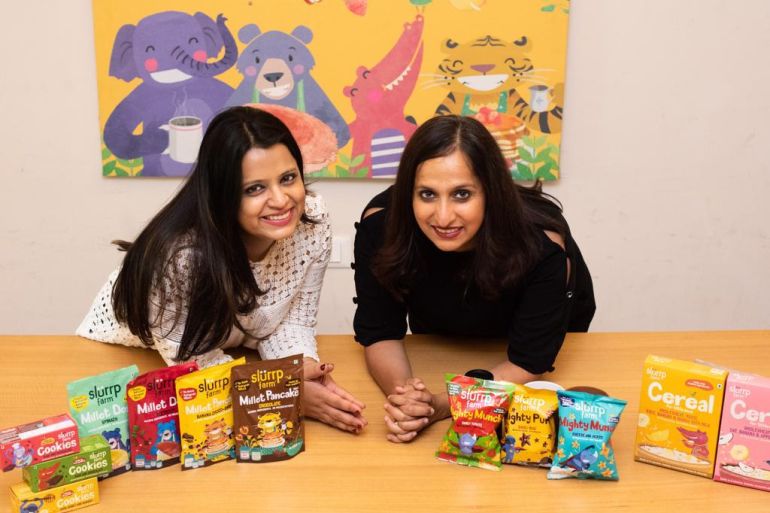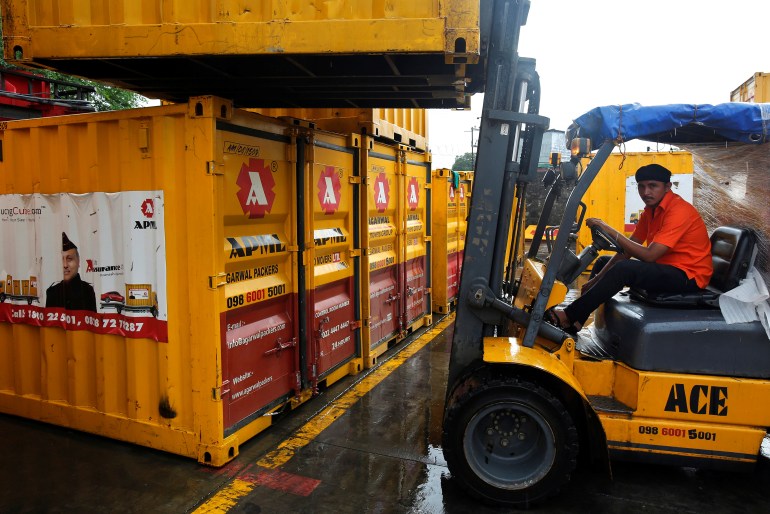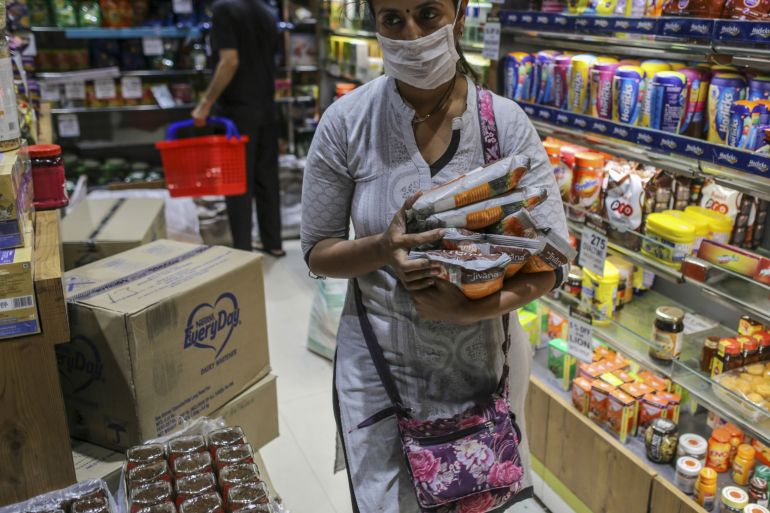This Indian startup has not only survived COVID, it is thriving
India’s swift, harsh COVID lockdown forced Slurrp Farm to slash costs, embrace technology and listen to its customers, but many other small firms have not been so lucky.

New Delhi, India – In February, as Meghana Narayan and Shauravi Malik watched sales figures come in for the organic baby food brand – Slurrp Farm – they had co-founded, they were certain that they would break even fairly quickly, a big achievement for a young startup.
Within weeks, that dream was shattered as India went into one of the world’s harshest lockdowns to rein in the spread of the coronavirus. The two entrepreneurs were plunged into a race to stop their business from imploding as revenue went down to almost zero.
Keep reading
list of 4 itemsIndia bans 43 apps in fresh wave of web sanctions against China
India’s winter of discontent: Farmers rise up against Modi
India’s economy appears to be stabilising as shoppers return
As the coronavirus pandemic spread across the world, it decimated economies, jobs and livelihoods. India was not spared, especially with the sudden, overnight lockdown announced by Prime Minister Narendra Modi in late March. Businesses large and small had practically no time to prepare for a new, highly constrained world. But smaller firms were hit disproportionately hard.
“April was a no show for us,” recalls Narayan.
The pandemic forced many companies to retool and re-organise their businesses overnight in order to survive. Some, including Narayan and Malik’s, embarked on a radical overhaul. The result has been a company rebuilt practically from the ground up that has not only survived but is now thriving in the age of COVID.
“We had to change the DNA of our entire organisation,” says Malik. “It’s been the best of years and the worst of years … . It went from so s**t to so good so quickly,” she adds.
Change the DNA
Narayan and Malik left lucrative careers to set up Slurrp Farm in October 2016; Narayan had worked as an associate principal at consulting firm McKinsey while Malik was an investment manager at British airline billionaire Richard Branson’s family office.
The two mothers had struggled to find healthy food that was free from preservatives, refined flour and sugar for their toddlers and realised that other parents would be just as eager to buy such products, if they existed.
They started out with two products, cookies and baby cereals, and built up their range to 17, selling through more than 600 stores across multiple cities, and online. Slurrp Farm’s products now include packaged health foods and millet-based mixes for pancakes and dosas, light crepes made from a lightly fermented batter.
Their monthly revenue grew to 5 million rupees ($68,000) before everything was shut down.
Today, India has 9.9 million coronavirus cases, the second-highest number worldwide after the US. Back in March, the country was seeing its first cases and few predicted a strict lockdown coming.

But Narayan and Malik had been tracking developments and saw other countries shutting down. They also realised that fear of infection was making basic activities like buying groceries more complicated.
“We could see how the mother of a young child, our client, wouldn’t go racing to a store,” says Narayan.
Up to that point, their revenues were split equally between sales from brick-and-mortar stores and e-commerce platforms. They decided it was time to shift strategy and to sell predominantly online.
But that also meant letting go of more than half of their staff of 45, many of whom were contract workers who would promote their products at stores, but also included a handful of key employees who were in-charge of offline sales and were now no longer needed.
“The business pivot was the easy part. The hardest part was how to deal with shutting down a business line and the people impact of that,” says Malik. “I cried. But we were looking at our [profit and loss statement] and we were, like, we’re going to cut each and every one of these costs.”
There was more pain to come. India’s lockdown went into effect three days after Slurrp Farm announced its new strategy. Narayan and Malik pored through every cent the company was spending to figure out what else to slash.
“We had to think to the point that can we run this company, just the two of us, if that’s what it would take to survive? Because how do you know how long this lockdown will continue?” Narayan recalled.
They shut down their office and a newly leased basement space that they had set up to host weekly events to introduce children to millet-based foods with millet and moved all their furniture into a friend’s parent’s house.
“We didn’t know what hit us,” recalls Malik. “No one was paying us. It was negative, negative, negative.”
The big pivot
They were not alone.
More than a third of small and medium enterprises surveyed in June by the All India Manufacturers’ Organisation said their businesses were beyond rescuing.
Their financial health and recovery are key to many Indian livelihoods – micro and small enterprises employ approximately 110 million workers and contribute 30 percent of the country’s gross domestic product (GDP).
“When the pandemic hit, everybody was lost,” says Padmaja Ruparel, co-founder of the Indian Angel Network, an industry body that helps startups, and founding partner of the Indian Angel Network Fund. “The first few weeks were spent just trying to get a grip on the situation and to ensure you’re standing and have not fallen already. The main focus was to preserve cash.”

Once that was sorted, the emphasis shifted to how to go “back to the basics,” says Ruparel. That involved evaluating the needs of consumers and how to manage logistics, among other issues. “Companies had to rethink how they operate and what they operate with. Huge pivots happened.”
For instance, a startup that offered last-mile commute services suddenly found it had no business as no one was going to offices, so it shifted to providing delivery services. Another company that made an automated, waterless solar-panel cleaning product for large solar parks started making ventilators.
These strategies worked, as did Slurrp Farm’s move to selling online.
One advantage was that Narayan and Malik no longer had to chase retailers for payments, a common problem in India. For nine months now, they have been sending reminders to a popular brick-and-mortar retailer about 150,000 rupees ($2,000) it owes them.
But there were problems with the new regime of delivering their own orders. There was a severe shortage of packaging material and labour shortage as many workers had gone back to their home towns in the early weeks of the lockdown. “We had vehicles with our goods standing outside the warehouses of Amazon and others but no one to unload them,” says Narayan.
This forced the pair to tweak their business once again. They made a deal with a leading logistics company so they could sell through their own website. They used packaging material put aside for products meant for export to the United Arab Emirates and printed labels in English to stick on them. They paused production on a product that was incurring losses.
“Basically we stopped chasing all unsustainable business lines … and took a lot of calls that ended up being just right for the business,” says Malik.
Samrath Bedi, one of Slurrp Farm’s earliest angel investors, also runs high-end skincare brand Forest Essentials and has invested in several other startups. He says that for young startups everything is so cost and sales-dependent that most are not able to “weather out a long storm.” The fact that Slurrp Farm had been selling on- and offline from the start “is what saved them,” he said.
Give them something healthy
The company also developed several new products – including a line of healthy millet-based cake mixes that Narayan calls a “COVID-19 product” – an idea she came up with after seeing social media light up with an endless stream of photos of cakes that people were baking now they were stuck at home. “I thought we may as well give them something healthy to eat,” she recalls with a laugh.

Packaged food has done “quite well” during the pandemic, says Ankur Bisen, senior vice president at retail consultancy Technopak. “Since the eating out options had [been] extinguished, that demand shifted to the home in the form of cooking at home including ready-to-cook, ready-to-eat food. Plus, because of COVID-19, people were looking for healthy options.”
Slurrp Farms is benefitting from those trends. The company’s revenues now are double its pre-COVID-19 peak, its cake mixes are a hit and they just closed a funding round with Fireside Ventures, an early-stage investor specialising in consumer products.
In the past few months, Slurrp Farm has also started selling in Singapore and Europe and has applied for a certificate from the US Food and Drug Administration to be able to sell in the US.
“There was no way we could have been ready for the year we had,” says Malik. Adds Narayan: “At that time [of the lockdown] it was a do or die [situation] for us. The energy that everyone brought to saving what we had built was what did it.”
This article is part of Al Jazeera Digital’s ongoing series profiling small businesses around the globe that have survived market disruptions from COVID-19 as well as economic challenges unique to their countries. Click to read about small businesses in Tehran, Beirut, Mumbai, the central English town of Wigston in the United Kingdom, Islamabad and Hong Kong.